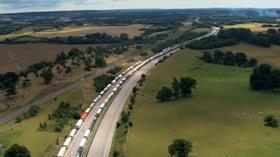
Fears are growing over the impact of a no-deal Brexit, which UK prime minister Theresa May warns is becoming increasingly likely, as major issues including the Irish border arrangement remain unresolved.
The UK is officially set to leave the EU on 29 March 2019. If a deal is concluded, then the UK will enter a transition period of just under two years from that date, during which EU rules will still apply.
However, if no deal has been struck by that date, the UK will immediately revert to trading under WTO rules, requiring customs and regulatory checks and the likely imposition of tariffs.
According to the British Retail Consortium (BRC), a no-deal Brexit would necessitate WTO tariffs of, on average, 22 per cent on foods imported to the UK from the EU, in order for UK producers to remain competitive.
It is this disaster scenario that the Food Research Collaboration, an academic group specialising in food policy, warns against in its report, Feeding Britain: Food Security After Brexit.
The need for customs and regulatory checks is expected to lead to major disruption at UK ports like Dover and European ports like Rotterdam, with dedicated lorry parks in coastal areas in Kent unlikely to be ready by March.
However, the solution currently being proposed by government ministers somehow threatens to make a bad situation even worse.
UK ministers are reportedly considering plans to suspend food safety controls on imports in the event of a no-deal Brexit in order to prevent perishable goods being delayed at the border.
According to the “Feeding Britain” report’s academics, EU countries might then retaliate by blocking exports from the UK due to a perceived “cavalier approach” to safety standards.
The consequences of such retaliation are grave, since the UK sources 30 per cent of its food from the EU, plus an additional 11 per cent via deals negotiated by the EU with other nations.
One of the report’s authors, Professor Erik Millstone, concluded: “It is vital, in the context of negotiating and enacting Brexit, that the Food Standards Agency, and the UK government more generally, avoid any decisions, proposals or actions, that could adversely affect food safety standards in the UK or the reputation of the UK’s food supply.”






No comments yet